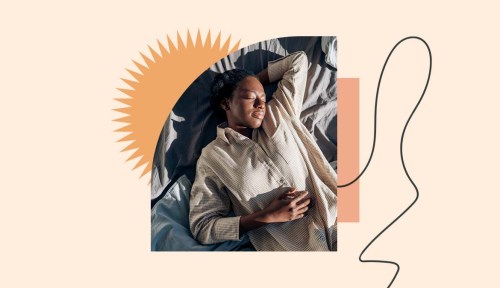Can You Plan Your Day To Sleep Better at Night?
There are so many things that you can do during your day to sleep better at night, or sleep worse. Explore best practices with Kate Spies.

When it comes to sleeping better, there’s no shortage of advice. It seems like every day brings a new recommendation or best practice (like turning off your cell phone before bed). Sadly, what you do during the day does impact your sleep—believe it or not.
In the most recent episode of The Well + Good Podcast, general manager Kate Spies talks with sleep experts Jenna Gress-Smith, PhD, a clinical psychologist and sleep health expert, and Jade Wu, PhD, DBSM, board-certified behavioral sleep medicine specialist and researcher at Duke University School of Medicine. These two sleep experts offer valuable insight into what’s helping people sleep better. The common thread? What you do during the day has an influence on the zzzs you catch at night.
Daylight exposure can jump-start your schedule
How you wake up can impact the following night’s sleep. The reason? Your circadian rhythm is impacted by sunlight. Circadian rhythm, according to the National Institute of Health, is a combination of physical, mental, and behavioral changes that happen within your body during a 24-hour period to facilitate your sleep and wake pattern. Daylight has a powerful influence on how the cycle works. Dr. Wu explains that getting direct sunlight within minutes of waking up can help usher your body into wakefulness. Conversely, reducing your exposure to bright light helps your body prepare for bed when the day winds down. Dr. Wu says that sometimes your body can be slower without sunlight exposure, resulting in a later wind down at the end of the day.
Embracing your chronotype might help
Spies mentions that COVID-19 has upended sleep routines. Dr. Wu agrees that stress has impacted sleep quality and people’s ability to get enough rest, but, on the other hand, some folks have seen improvements. This might have something to do with chronotypes, Dr. Wu says, which are a classification used to describe someone’s natural sleep schedule.
Those with a night owl chronotype may have seen pandemic-era sleep improvements if they’ve been able to shift activities to occur later in the day. However, those with early chronotypes may decide to start their remote work as early as they want—and work with their employer to allow them to wrap up their schedule sooner. For mixed chronotypes, some folks may benefit from taking more breaks to nap during the day. Embracing your chronotype by starting your day later or earlier might positively impact your energy levels and feelings of restfulness.
Sleep tech can help—or hurt
Sleep tech is super valuable to individuals trying to understand their bodies, says Dr. Gress-Smith, a sleep health expert who works with Crescent Health, a company that offers personalized sleep coaching and programs, leveraging the data from devices like Oura ring, to optimize and improve sleep health. However, people with insomnia or other conditions that impact sleep may find the numbers confounding, she says.
When someone gets bogged down by the data from a watch or ring, it can distract and make a sleep improvement plan feel harder to achieve. These folks should feel good about the rest that they’re getting regardless of the “qualitative” evaluation that these tracking devices share, Dr. Gress-Smith says.
All in all, it seems like we learn something new about sleep science with every passing day. However, strategizing better sleep is best left for during the day and not while your mind is racing at night. If you’re a night owl, maybe it makes sense to hit the snooze button a few more times. Tell everyone that you’re “leaning into your chronotype.”
Oh hi! You look like someone who loves free workouts, discounts for cutting-edge wellness brands, and exclusive Well+Good content. Sign up for Well+, our online community of wellness insiders, and unlock your rewards instantly.
Sign Up for Our Daily Newsletter
Get all the latest in wellness, trends, food, fitness, beauty, and more delivered right to your inbox.
Got it, you've been added to our email list.









